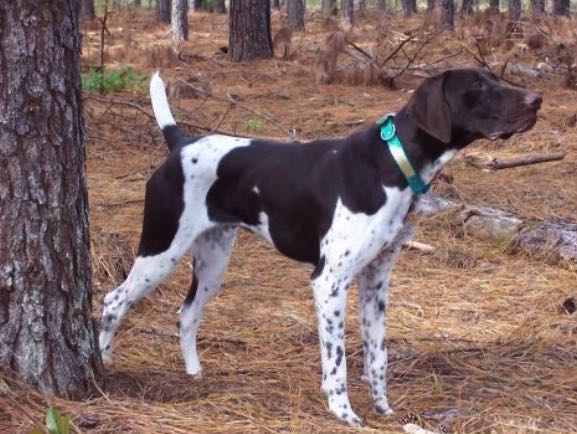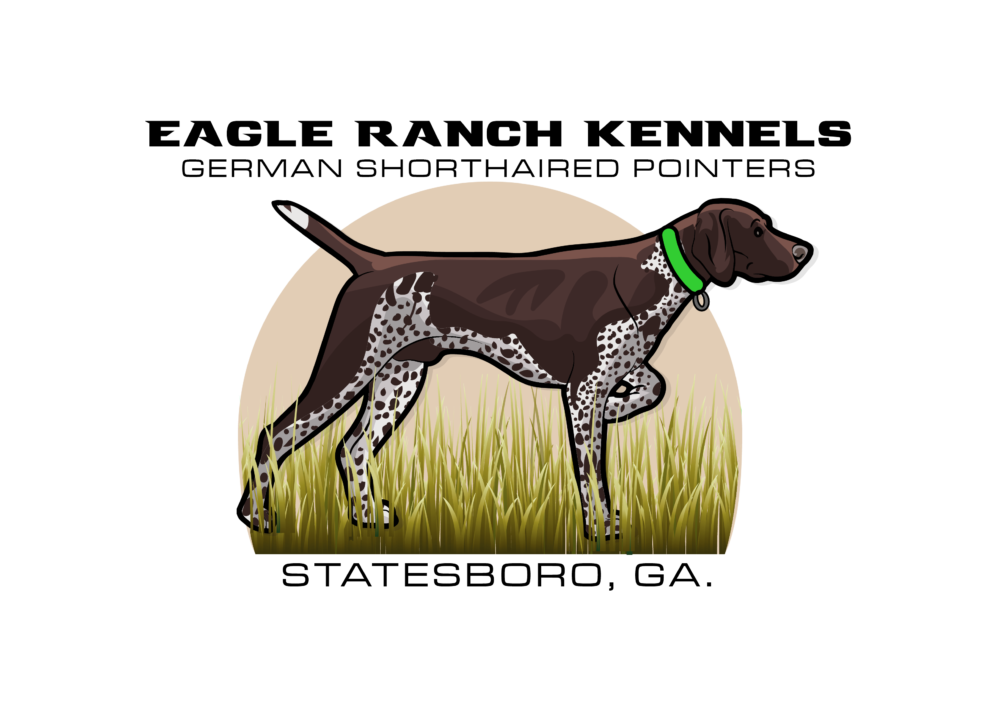Breed History & General Information
The following information is sourced directly from the German Shorthaired Pointer Club of America. For additional information visit their website at www.gspca.org.
“The GSP was developed in Germany in the late 1800’s to be an all-purpose dog. It was the original intent of the breeders to develop a breed of dog with inbred instinct for multiple tasks, thus requiring little time to “force train”. The GSP was bred to point, retrieve, trail wounded game, hunt both large and small game, furred and feathered and to work in low or heavy cover as well as water. The dog was also intended to be a family companion good with both adults and children.”
“The breed is considered medium-to-large in size with the males typically being larger than the females. One should be able to determine the sex of the dog based on general appearance, i.e., males should look masculine, and females should look feminine. A fairly healthy breed but the first-time buyer should always inquire about health clearances of the sire and dam when looking for a puppy. Breeders should have no problem discussing or answering questions about health related issues. The following are considered as a minimum questions to ask about: OFA or PennHip – hip dysplasia; Cardiac-echocardiogram for congenital cardiac; CERF – current eye clearance of PRA done each year until age 6 every two years afterward; CD – DNA test for carrier status for cone degeneration (may be cleared by both Parents DNA test indicating “normal” a non-carrier.)”

“It is important to remember this is primarily a hunting dog, bred for a purpose, and as such will have a high level of activity and/or energy that needs to be channeled. Just like people, not all are created equal and while some will learn a task quickly, others may take more time and patience. GSPs tend to be eager to please and willing to learn at relatively young ages if the training sessions are not forced and kept short and simple. Even though some may appear physically mature by the time they are six months old their brain may not be engaged until they reach two years of age. Thus, you may have an adult size dog with a “teenage brain.”
“The coat of a GSP is short but not thin and when one runs their hand across a dog the hair should not feel soft to the touch with exception of the hair found on the head and ears. The GSP head is shaped differently than that found on a Lab or Pointer and its ear is slightly larger and longer, not pointed at the end but slightly rounded. To prevent field injuries the tail is docked, not short like a Boxer or Doberman but should be at least 6 to 8 inches long with some a bit longer and with dewclaws removed. Often confused by some as a Dalmatian because some of the coat patterns of the GSP are bright white with small markings referred to as “ticking” or with Labs because of the solid liver or black versions. Yet if compared side by side it would be readily apparent that none of them look alike.”
Breed Ownership
As a general rule, dog ownership is a big responsibility. Dogs can’t choose their owners so it’s important that we, as owners, choose for them responsibly.
Eagle Ranch Kennels takes GSP adoption/placement very seriously. We believe it is just as important to match the owner with the puppy as it is to match the puppy with the owner.
A few points of consideration when thinking about GSP ownership:
- Know the breed
- GSP’s are canine athletes. They are high energy, versatile working dogs. They love to run and most like the water, too. They love to find, point, chase, and retrieve. Regardless of whether the owner is a hunter or not, finding ways to satisfy their instinctive hunting traits is key to their happiness. GSP’s are very bright and have lots of curiosity. They tend to do very well as family dogs and get along with children provided, they are appropriately introduced to a home with children (and vice versa). GSP’s have active minds and need to be kept occupied. By nature they can be mischeivious (some say straight up practical jokers) but bored GSP’s typically become misbehaving GSP’s. They crave time with their owners and love pleasing people with their work. Conversely, GSP’s are typically not good at being alone and it is not uncommon for some GSPs to get separation anxiety. Crate training is key for them, especially if there won’t always be someone home during the business day. The bottom line is that with good socialization, formal, consistent training, and regular exercise, the GSP is a wonderful breed that makes a great companion and hunter.
- Know yourself
- First and foremost, (no matter how cute the puppy pictures are) be honest with yourself. Are you sure you’re ready for GSP ownership? They are awesome dogs and we love the fact that anyone would consider one of our GSPs but in mulling this over please ask yourself the following questions:
- Are you a patient person? Do you tolerate mistakes that come with puppies learning?
- Do you have a sense of humor? GSP’s can be pranksters.
- Do you have any issues with pet allergies or other health concerns that would make dog ownership problematic for you or the dog?
- Do you have neighbors? Are they tolerant of dogs?
- Do you have infants and/or children? Is so, can you dedicate the time needed to make sure your kids (and dogs) can learn to live together safely?
- Can you provide a healthy and safe kennel environment (indoors and outdoors)?
- Do you have the time for this? Will your schedule permit daily exercise time, training time, etc. with your dog? Does your lifestyle and career allow for that?
- If not a hunter, do you at least enjoy doing other things outdoors with your pets on a regular basis?
- Where do you live? Do you have a safe secure place for pets to be outside and exercise?
- If in the city or you have apartment style living, do you have access to a park or dog park?
- What’s your daily routine? Are you willing to incorporate the dog into other family activities if needed?
- Do you travel for work? Are there times when you might be gone for extended periods? If so, do you have access to safe boarding while you’re gone?
- Will you invest the resources needed to make sure the dog is appropriately trained for obedience and hunting (if applicable)? Even a well-trained GSP can be a handful, but an untrained GSP can be unmanageable. Make sure you’re willing to train your dog (or have him/her trained) to get the most out of the relationship.
- Can you afford it? A well-bred puppy from a responsible breeder alone isn’t cheap but do you have the financial resources to care for your GSP over the long run? Have a financial plan to ensure you can provide for everything your GSP will need. The cost of the puppy is small compared to the resources it takes to care for them over a lifetime.
- These questions highlight the commitment it takes to own any dog but, in our opinion, are emphasized when considering a GSP (or any sporting/working dog breed). Especially if you plan to hunt with your dog. No matter how well-bred these dogs are they don’t magically turn into polished hunting dogs and obedient family dogs. It takes work. Lots of work. And once trained, they require regular maintenance to stay sharp.
- First and foremost, (no matter how cute the puppy pictures are) be honest with yourself. Are you sure you’re ready for GSP ownership? They are awesome dogs and we love the fact that anyone would consider one of our GSPs but in mulling this over please ask yourself the following questions:
- Do your homework
- While our personal experiences with owning GSP’s might be helpful, don’t just take our word for it. There is also plenty of additional professional advice available. The German Shorthaired Pointer Club of America is a great resource (www.gspca.org) that should always be considered but in terms of information about whether GSP ownership is right for you, the source of truth we prefer is the Southeast German Shorthaired Pointer Rescue (www.gsprescue.org). This all-volunteer group works tirelessly to find homes for GSP’s that have been abandoned, sheltered, or otherwise need to be rehomed from their original owners. Sometimes these circumstances are out of the control of the original owner but often rescue GSP’s are the result of an owner that either didn’t think through the decision to take on a GSP in the first place and/or was ill equipped to manage a GSP. Eagle Ranch Kennels would encourage you visit this group’s website and learn more before making a final decision to pursue a GSP.
